Where to buy a second fridge or freezer for storing food—and what to look for
Storing food in bulk just got easier.
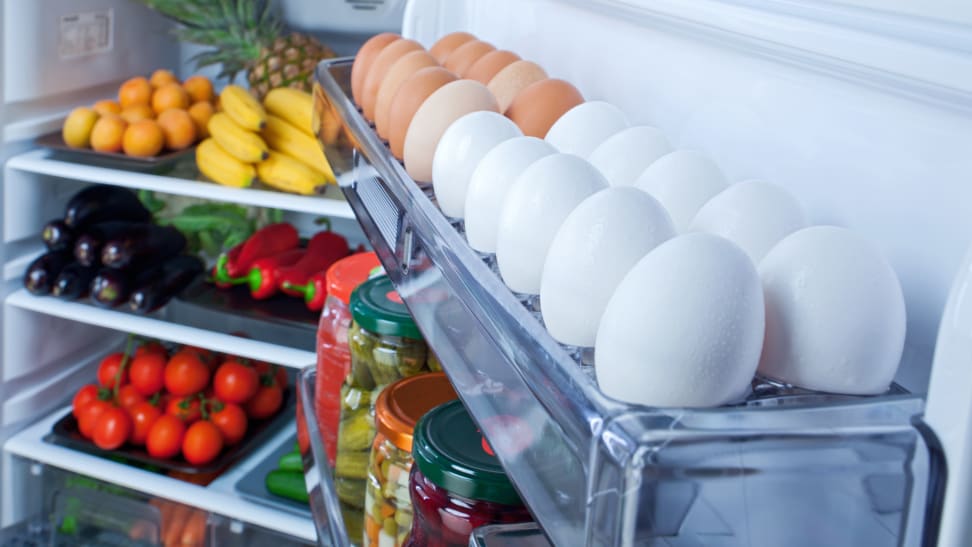 Credit:
Getty Images / okanmetin
Credit:
Getty Images / okanmetin
Recommendations are independently chosen by Reviewed's editors. Purchases made through the links below may earn us and our publishing partners a commission. Prices were accurate at the time this article was published but may change over time.
If a growing family or flourishing vegetable garden has you in need of more food storage, buying a second fridge or freezer can be a viable option. But shopping can be complicated—it’s a big decision since these appliances have decades-long lifespans at at-times hefty price tags.
At Reviewed, we have years of experience lab-testing refrigerators and researching the best ways to get the most out of the appliances you already own.
Here’s a look at the different types of fridges and freezers are appropriate for each situation, common pitfalls to avoid, and what you should know before making your purchase.
What you need to know about keeping a fridge in your garage

Fridges operate best at certain temperatures.
Fridges and freezers are designed to operate within certain temperatures. Most fridges work between 49°F and 110°F. Before purchasing, you should check out the user manual (you can usually find it on the manufacturer’s website) to find the optimum conditions.
You should also invest in a standalone thermometer. While your fridge or freezer might have a temperature display, it might not be accurate if your garage is very cold or hot. It’s important to know how cold your fridge or freezer is because harmful bacteria can grow if it gets too warm. You can consult the FDA guidelines for safe storage conditions.
Finally, garage fridges are not the same as outdoor fridges. Outdoor fridges are specialized pieces of equipment that are weatherproof and designed to fit under outdoor bars or countertops.
Pro tip: What is freezer burn and how to prevent it?

Air-tight packaging can help prevent freezer burn.
If your garage fluctuates in temperature, freezer burn is something to watch out for. Freezer burn occurs because of sublimation in food—a process where ice turns into water vapor, leaving meat tough and dry. Any time the temperature in your freezer rises above 0°F, sublimation happens.
You can prevent freezer burn by keeping meat in air-tight packaging, making sure your freezer is maintaining a 0°F temperature, and making sure you don’t store meat for too long.
Which fridge or freezer is right for you?
With a number of different styles to choose from, we break down what to look for—and which styles may be better suited for your kitchen.
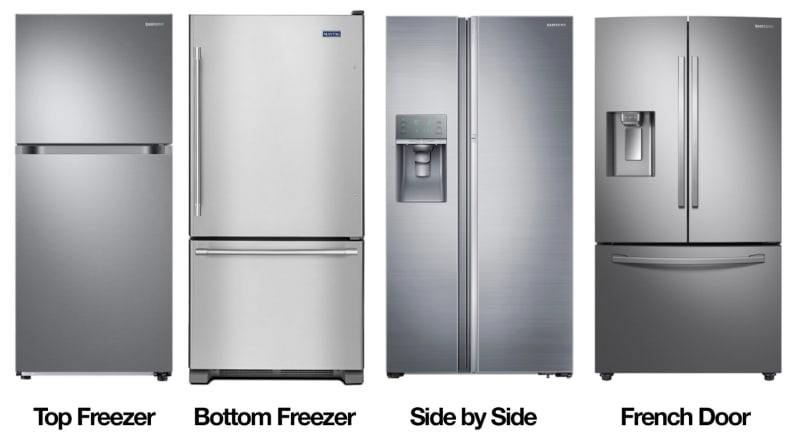
These are the main types of full-sized fridges
Top-freezer refrigerators
Pros: Good storage space, affordable Cons: Limited freezer space
Top freezers are the classic design that you probably grew up with. What they lack in fancy options like through-the-door water or specialized drawers, they make up for in storage space. Because they have thin shelves and few compartments, our in-lab measurements show that top freezers offer the most amount of storage for the price.
Our recommendation: Whirlpool WRT318FZDW
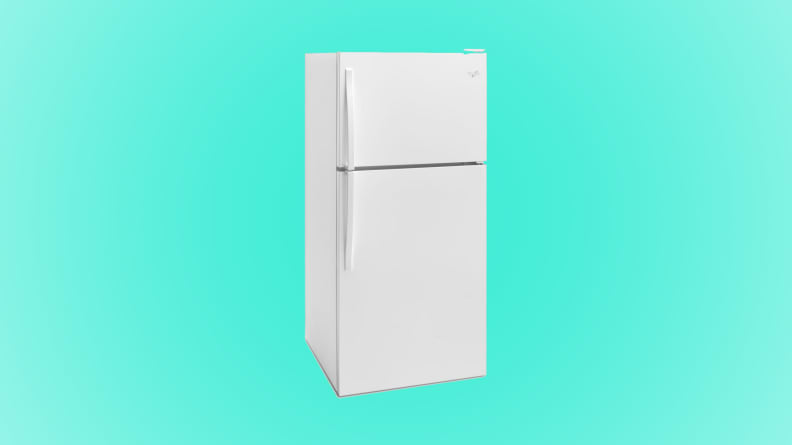
The WRT318FZDW is a solid top freezer.
The Whirlpool WRT318FZDB is a quality top-freezer refrigerator. Our lab tests showed that it holds temperatures well—it effortlessly maintained 37°F in the fridge section and 0°F in the freezer. If you’re going to use a secondary fridge for extra food storage, consistent temperatures are a must. That’s why this Whirlpool ranks so high in our best fridges under $1,000 roundup. We should note that this fridge is designed to work at ambient temperatures between 55°F and 110°F, so a basement is preferable to a garage.
Get the Whirlpool WRT318FZDB at AJ Madison for $624.10
Bottom-freezer refrigerators
Pros: Easy access to the fridge, good storage space in the fridge cavity Cons: Tougher access to the freezer
This type of configuration is fairly rare. The concept is pretty straightforward: The freezer is on the bottom of the fridge. Typically, these models offer more storage than top freezers. The idea behind them is that most people access the fridge section more often so why not put it in easier reach.
Our recommendation: Bosch B11CB50SSS

Bottom freezers give easier access to the fridge.
The Bosch B11CB50SSS is an 11-cubic-foot bottom freezer that features a counter-depth design, making it ideal for placement in compact kitchen layouts. It's designed to sit flush with the countertop, with hidden hinges for a discreet look.
Get the Bosch B11CB50SSS at Appliances Connection for $1,444
Mini fridges
Pros: Affordable, easy to store Cons: Poor temperature consistency
If square footage is a super-limited resource, a mini fridge can be a great solution. A few models even offer a tiny freezer section that can hold a TV dinner or two.
Our recommendation: RCA RFR322
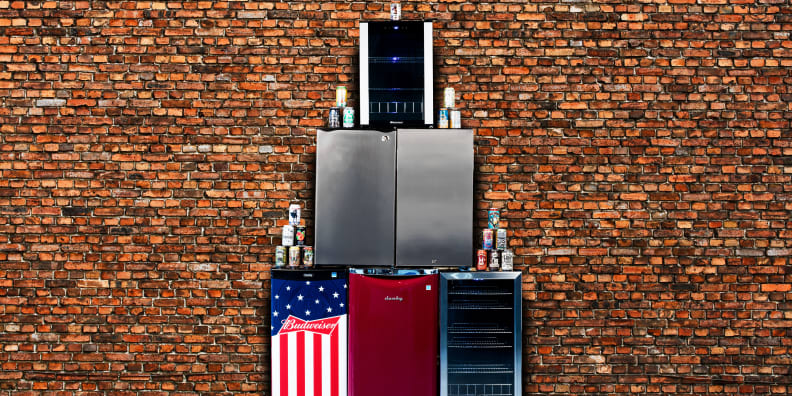
Mini fridges can act as a secondary fridge in a tiny home.
The RCA RFR322, also known as the Igloo FR322, is perfect if you want to free up some space in your main fridge. With a can dispenser in the door and 3.2 cu. ft. of space, move all extra beverages and snacks to your mini fridge so you can fit more meat and vegetables into your home.
Get the RCA RFR322 at Walmart for $132.06
Convertible freezer/refrigerators
Pros: Can be either a fridge or freezer Cons: Poor temperature consistency
A lot of people don’t know about these. Convertibles are single-cavity units that become either a fridge or a freezer at the flip of a switch. Hunters find these units useful because they can use them for produce or game depending on the time of year. Being a jack-of-all-trades means they master none; however they will suffice if you do not require daily access.
Our recommendation: Midea MRU14F2AWW

Convertible units can set as a fridge or a freezer.
Midea is a company that normally makes appliances for other brands; older GE front-load washers were once made by Midea. The MRU14F2AWW is a 13.8-cubic-foot convertible unit that can be either a fridge or a freezer at a click of a button. While we did not test this unit ourselves, 93% of buyers at Lowe's recommend this product.
Get the Midea MRU14F2AWW at Lowe's for $549
Chest freezers
Pros: Very low temperatures, lots of storage space Cons: Prone to ice build up, hard to organize
Horizontal and deep, chest freezers offer the most storage of the two standalone freezer types. Performance-wise, chest freezers also create the lowest temperatures. If you’re looking for long-term storage of meat and other foodstuffs, you’re less likely to get freezer burn with a chest freezer. However, over time, chest freezers do tend to get ice buildup. They are also harder to organize and retrieve items because they usually only come with a few dividers and hanging baskets.
Our recommendation: Frigidaire FFFC09M1RW
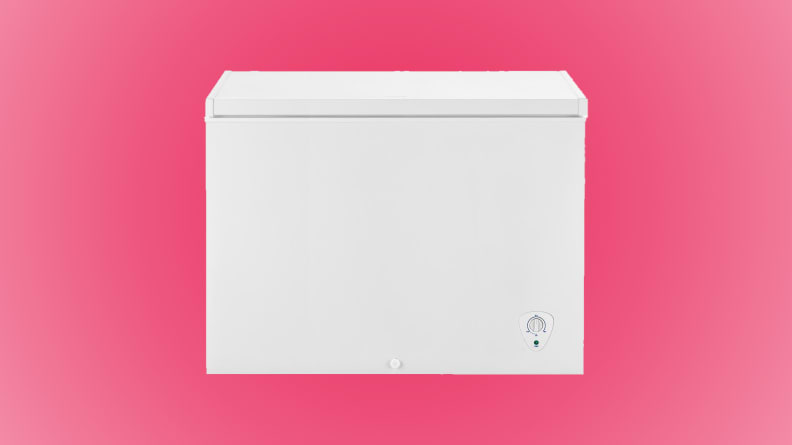
Chest freezers are harder to organize, but offers better temperature consistency.
While we didn’t test this model in our labs, the Frigidaire FFFC09M1RW has a very similar design to one of the best chest freezers we’ve ever tested. User reviews for the FFFC09M1RW are pretty good. Across Home Depot, Walmart, and AJ Madison, this chest freezer rates 4.7 stars out of 5. People like how much food they can store with the 8.7-cubic-foot capacity and how useful the hanging basket is.
Get the Frigidaire FFFC09M1RW at Home Depot for $359.10
Upright freezers
Pros: Easier to organize, self-defrosting, easier to place Cons: More prone to freezer burn, noisy
Upright freezers look a lot like their fridge counterparts. They tend to have on-the-door bins, shelves, and drawers, making it easier to organize your food. These models have defrost cycles, so you’re less likely to get ice build up, but your food is more likely to develop freezer burn.
Our recommendation: GE FUF17DLRWW
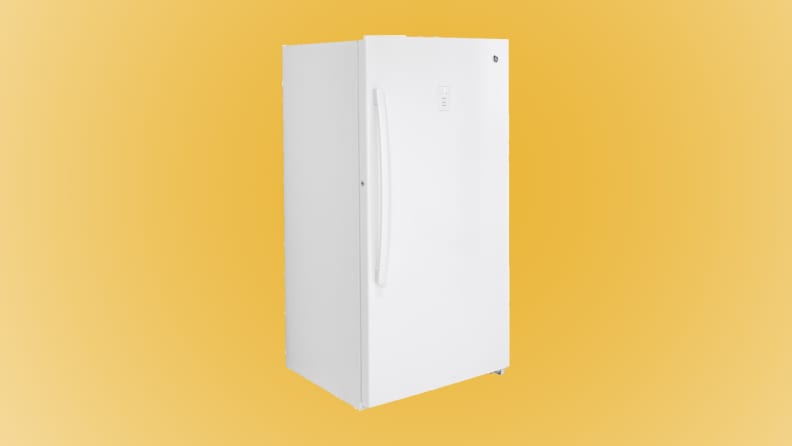
As a standalone freezer, this GE offers plenty of space.
The GE FUF17DLRWW is a fan favorite with hundreds of 5-star reviews across Home Depot, AJ Madison, and Lowe’s. It is designed to work in a garage, meaning it’s insulated for work the same during sweltering summers (110°F) or frigid winters (0°F).
While we did not test this model in our labs, after researching the specifications, we can see the appeal. The 17.3-cubic-foot capacity means you can store plenty of meat and frozen meals. The FUF17DLRWW has internal LED lights so you can find what you’re looking for even at night.
Get the GE FUF17DLRWW at Appliance Connection for $849
Side-by-side refrigerators
Pros: Can fit anywhere, easy access to freezer and fridge Cons: Low storage space
This type of fridge is split right down the middle between the fridge and freezer sections. You’ll probably want to avoid this type of fridge for your secondary, because they often offer extra features like water dispensers and through-the-door ice, which would likely be wasted in the garage or basement.
Our recommendation: Skip this style for your garage
While we think there are better options for a second fridge, if you’re sold on a side-by-side, here’s a roundup of the best side-by-side fridges we’ve tested.
French door refrigerators
Pros: Lots of features, presentable Cons Expensive, not good for garages
You should definitely avoid this style for a secondary fridge unless you’re planning on placing it in a finished basement or guest house. Defined by a top-mounted fridge compartment that is accessed via two swinging doors, these fridges tend to be the most expensive. In exchange, they offer the most extra features like specialized compartments and temperature controls.
Our recommendation: Consider this for your kitchen instead
If you're sold on a French door refrigerator for your home, consider upgrading your kitchen and moving your existing fridge outside to the garage or downstairs to the basement. We've tested some of the best French door fridges on the market, which include the Frigidaire Gallery FG4H2272UF and Bosch B36CD50SNS so you can find one that works for you.





